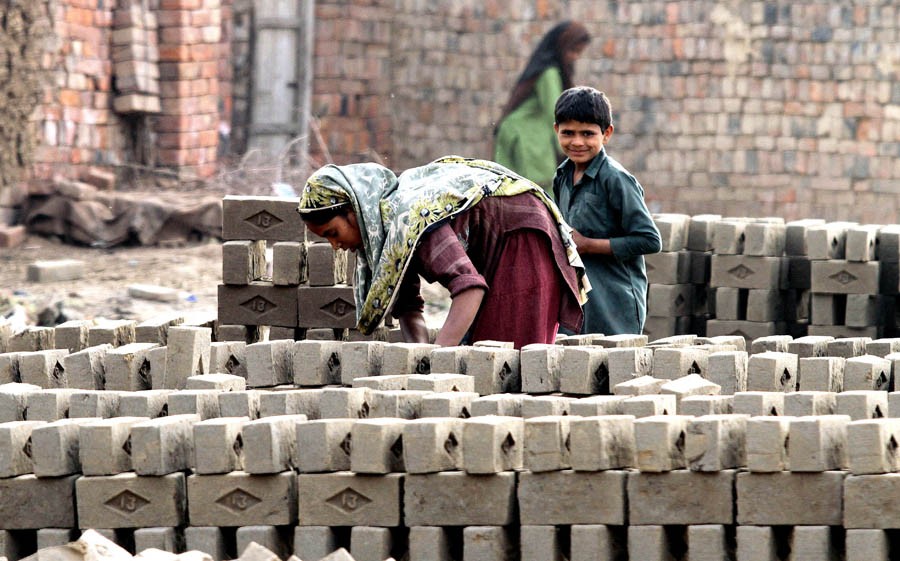
A healthcare centre for brick kiln women may have far reaching effects in a country where population planning is very much needed

We have mostly been talking about the exploitation of labour and harsh living conditions of those working at brick kilns but recently a healthcare centre by the name of Sehat Ghar has started operating for women workers close to where they work.
One health centre caters to a cluster of 16 kilns in district Lahore. The Brick Kiln Owners Association of Pakistan (BKOAP) identified this cluster and built a healthcare centre where the government has provided doctors.
Development Impact Solutions SMC Pvt Ltd (DIS) started this pilot project to draw women workers to seek health improvement. Project Director Samia Rauf says, "The idea is to effect behavioural change in workers and build their confidence to begin with."
In six weeks, many women workers have visited the clinic and the number is increasing. Bhattas are operating in catchment areas of the city, so there are access issues as well. Women workers at brick kilns predominantly rely on daees and quacks for pre-natal, delivery and post-natal services, putting both mother and child at risk of health complications and even death.
There are 5,149 men and women workers at the 16 brick kiln cluster and 51 per cent reside there, according to DIS.
Establishment of this healthcare centre is an effort to bring in the most illiterate of population towards formal health services. Workers who are used to getting drip and injection, are being motivated to take their health more seriously.
From this centre they can be further referred to rural health unit or hospital if needed and will be saved from seeing quacks. Also, the idea is to inform these women of how to take care of their health and when to visit a doctor. For this, Integrated Maternal and Childhood Services (IMCS) has directed lady health workers to visit the kiln women workers to give them awareness.
Establishment of a healthcare centre for kiln workers is a big step for which all the partners should be appreciated. Kiln owners have always been criticised till now but it is heartening to see their association constructing a clinic for their workers.
This is just the beginning. When women will learn about health they will also reflect about family size. At present couples at brick kiln have 4-8 children on average. The health services at the centre will include family planning as well in future.
We must know that 12 out of 17 Sustainable Development Goals (SDGs) are driven by population dynamics.
The Population Council Pakistan has issued a Punjab Population Fact Sheet 2016, according to which Multiple Indicator Cluster Survey (MICS) in Punjab puts total fertility rate in Punjab at 3.5 children per woman and says most women want three children at the most. 7 out of 10 women and 6 out of 10 men want to space their children.
39 out of 100 people use contraceptives (any method) while 31 per cent use modern methods. What needs attention is the unmet need for family planning which has been found to be 17.5 per cent.
Antenatal care which is also a focus of the pilot project of healthcare centre for kiln workers, reaches 79 per cent of the Punjab’s population. 65 per cent women avail the services of skilled birth attendants.
Infant Mortality rate per 1000 live births is 75 and under five mortality rate per 1000 live births is 93, according to Punjab population fact sheet 2016.
The Population Council that analyses population issues and trends helps governments design and implement effective population policies. The fact sheet says the population of Punjab has increased five times since Independence.
6,000 women die every year due to pregnancy related complications. 75 out of 1000 infants die before their first birthday.
An accelerated family planning programme can save 2,700 mothers every year, 73,000 infant deaths and 41,000 child deaths can be prevented and around 1.5 million pregnancies that women do not want at the time can be avoided.
An accelerated fertility decline in Punjab could result in both improved maternal and child health outcomes and ensure economic development in the province.
A healthcare centre for the poor illiterate people of brick kilns is a step in the right direction. If one centre works well, more such centres will open throughout the province. People need guidance and services.